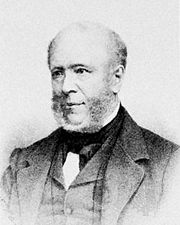
Everhardus Johannes Potgieter
Encyclopedia

Netherlands
The Netherlands is a constituent country of the Kingdom of the Netherlands, located mainly in North-West Europe and with several islands in the Caribbean. Mainland Netherlands borders the North Sea to the north and west, Belgium to the south, and Germany to the east, and shares maritime borders...
prose writer and poet
Poet
A poet is a person who writes poetry. A poet's work can be literal, meaning that his work is derived from a specific event, or metaphorical, meaning that his work can take on many meanings and forms. Poets have existed since antiquity, in nearly all languages, and have produced works that vary...
, who was born at Zwolle
Zwolle
Zwolle is a municipality and the capital city of the province of Overijssel, Netherlands, 120 kilometers northeast of Amsterdam. Zwolle has about 120,000 citizens.-History:...
in Overijssel
Overijssel
Overijssel is a province of the Netherlands in the central eastern part of the country. The region has a NUTS classification of NL21. The province's name means "Lands across river IJssel". The capital city of Overijssel is Zwolle and the largest city is Enschede...
.
He started life in a merchants office at Antwerp. In 1831 he made a journey to Sweden
Sweden
Sweden , officially the Kingdom of Sweden , is a Nordic country on the Scandinavian Peninsula in Northern Europe. Sweden borders with Norway and Finland and is connected to Denmark by a bridge-tunnel across the Öresund....
, described in two volumes, which appeared at Amsterdam
Amsterdam
Amsterdam is the largest city and the capital of the Netherlands. The current position of Amsterdam as capital city of the Kingdom of the Netherlands is governed by the constitution of August 24, 1815 and its successors. Amsterdam has a population of 783,364 within city limits, an urban population...
in 1836-1840. Soon afterwards he settled in Amsterdam, engaged in commercial pursuits on his own account, but with more and more inclination towards literature. With Heije, the popular poet of Holland in those days, and Bakhuizen van den Brink, the rising historian (see also Groen van Prinsterer
Guillaume Groen van Prinsterer
Guillaume Groen van Prinsterer , Dutch politician and historian, was born at Voorburg, near the Hague.-Overview:...
), Potgieter founded De Muzen ( The Muses, 1834-1836), a literary review, which was, however, soon superseded by De Gids ("The Guide"), a monthly, which became the leading magazine of Holland. In it he wrote, mostly under the initials of W. Dg, a great number of articles and poems.
The first collected edition of his poems (1832-1868) appeared in 2 vols (Haarlem, 1868-1875), preceded by some of his contributions to De Gids, in 2 vols also (Haarlem, 1864), and followed by 3 vols of his Studien en Schetsen ("Studies and Sketches," Haarlem, 1879). Soon after his death a more comprehensive edition of Potgieter's Verspreide en Nagelaten Werken ("Miscellaneous and Posthumous Works") was published in 8 vols by his friend and literary executor
Literary executor
A literary executor is a person with decision-making power in respect of a literary estate. According to Wills, Administration and Taxation: a practical guide "A will may appoint different executors to deal with different parts of the estate...
, Johan C Zimmerman (Haarlem, 1875-1877), who likewise supervised a more complete edition of Potgieter's writings which appeared at Haarlem in 1885 1890 in 19 vols.
Of Potgieter's Het Noorden in Omtrekken en Tafreelen ("The North in Outlines and Pictures") the third edition was issued in 1882, and an edition de luxe of his poems followed at Haarlem in 1893. Under the title of Personen en Onderwerpen ("Persons and Subjects") many of Potgieter's criticisms had collectively appeared in 3 vols at Haarlem in 1885, with an introduction by Conrad Busken-Huet
Conrad Busken-Huet
Conrad Busken Huet , was a Dutch literary critic.-Biography:Busken Huet attended Gymnasium Haganum. He was trained for the Church, and, after studying at Geneva and Lausanne, was appointed pastor of the Walloon chapel in Haarlem in 1851...
.
Potgieter's favourite master among the Dutch classics was Hooft, whose peculiarities in style and language he admired and imitated. The same vein of altruistic, if often exaggerated and biased, abhorrence of the wonted conventionalities of literary life runs through all his writings, even through his private correspondence with Huet, parts of which have been published.
Potgieter remained to his death the irreconcilable enemy of the Dutch Jan Salie, as the Dutchman is nicknamed who does not believe in the regeneration of the Dutch people. Potgieter held up the Netherlanders of the golden age of the 16th and 17th centuries as models to be emulated. In these views he essentially differed from Huet. Yet the two friends worked harmoniously together; and when Potgieter reluctantly gave up De Gids in 1865, it was Huet whom he chose as his successor.
Both then proceeded to Italy, and were present at the Dante festivities at Florence, which in Potgieter's case resulted in a poem in twenty stanza
Stanza
In poetry, a stanza is a unit within a larger poem. In modern poetry, the term is often equivalent with strophe; in popular vocal music, a stanza is typically referred to as a "verse"...
s, Florence (Haarlem, 1868). In Holland Potgieter's influence has been very marked and beneficial; but his own style, that of ultra-purist, was at times somewhat forced, stilted and not always easily understood.
----

